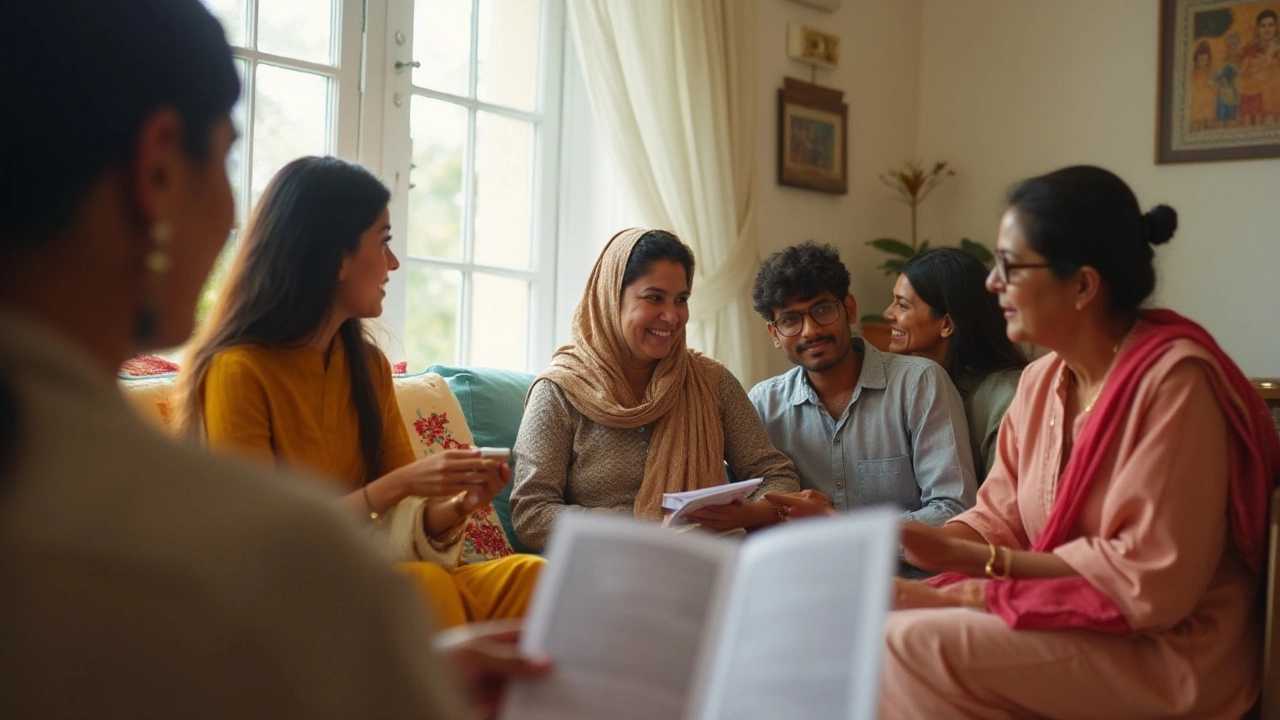- Home
- ::
- Surviving Stage 4 Cancer: Insights and Realities

Surviving Stage 4 Cancer: Insights and Realities
Stage 4 cancer is a term that brings with it a swirl of emotions and questions. It's a stage where cancer has spread to distant parts of the body, complicating the pathway to recovery. However, it's essential to realize that a diagnosis at this stage is not a definitive endpoint, but rather a part of the ongoing battle.
The advancements in medical treatments are providing new opportunities for those diagnosed with stage 4 cancer. From surgeries and chemotherapy to innovative immunotherapies, the landscape of options is evolving. Meanwhile, adopting a holistic approach that includes lifestyle changes and emotional support can provide significant benefits.
This article delves into the depths of living with stage 4 cancer, exploring the treatments, the day-to-day changes, and the stories of those who are managing to make the most of their journey. It's not merely about surviving; it's about finding a way to thrive with grace and determination.
- Understanding Stage 4 Cancer
- Emerging Treatment Options
- Lifestyle and Supportive Care
- Emotional and Psychological Support
- Real Stories of Hope and Resilience
Understanding Stage 4 Cancer
Stage 4 cancer signifies a pivotal chapter in the journey of a cancer patient. It's the phase where the disease has escalated to reach distant organs, beyond its initial location and proximate lymph nodes. This level of cancer is classified as 'metastatic,' marking its penetration into territories like the bones, liver, lungs, or even the brain, depending on the type of cancer involved. It's a complex network of cells that have found ways to travel and thrive in new environments, creating a situation where standard treatments are often complicated but not impossible.
At this stage, the cancer treatment plan typically shifts. While curing the disease is a challenging endeavor, the primary focus often turns toward extending life and improving its quality. Oncologists may recommend a blend of chemotherapy, radiation therapy, targeted therapies, or immunotherapy to manage symptoms and slow the progression of the disease. Integrative approaches that combine conventional medicine with complementary therapies like acupuncture or nutritional support can also play a significant role in treatment plans.
The journey with stage 4 cancer is uniquely personal and shaped by myriad factors, including the patient's overall health, the cancer's origin, and its specific characteristics. It's important for patients and their loved ones to have open and continuous discussions with their healthcare team. Doing so ensures they have a clear understanding of the available options, potential side effects, and the likely outcomes. Knowledge empowers them to make informed decisions about their care, tailoring it to best meet their physical and emotional needs.
The Reality Beyond the Diagnosis
The raw reality of a stage 4 cancer diagnosis involves acknowledging the current scientific understanding, but also remaining open to hope and emerging treatments. Survival rates vary dramatically depending on the type of cancer. For instance, recent statistics suggest five-year survival rates for stage 4 breast cancer can be around 29%, indicating that some patients manage to beat the odds and live significantly longer than expected. An array of factors influence these statistics, from the cancer's biology to the individual's response to treatments, underscoring the unpredictability and individuality of cancer journeys."Hope is a powerful force in the realm of cancer treatment. It instills courage and a fighting spirit in both patients and caregivers," echoes Dr. Karen Smith, a noted oncologist who believes in combining traditional treatment with innovative approaches.
Central to understanding stage 4 cancer is recognizing the body's resilience and the potential of personalized medicine. Each patient's journey is akin to an intricate puzzle, where researchers continue to unravel new clues about how cancers grow and how they can be tamed or even reversed over time. While the statistical landscape might seem daunting, stories of resilience and triumph continually surface, inspiring those who face similar battles.
Emerging Treatment Options
When someone is living with stage 4 cancer, the options for treatment can initially feel overwhelming. But it's critical to remember that every year, researchers and clinicians make promising strides forward in the fight against this complex disease. Traditional approaches like chemotherapy and radiation still play pivotal roles; however, the emergence of newer therapies is making waves. For instance, immunotherapy has been a game-changer in recent years. By harnessing the body's immune system, doctors aim to specifically target and destroy cancer cells without the wide-ranging side effects of more traditional treatments. Medications such as checkpoint inhibitors have shown remarkable efficacy in certain cancers by releasing the 'brakes' on the immune system and allowing it to fight cancer with renewed vigor.
Targeted therapies represent another exciting frontier. Unlike conventional chemotherapy that attacks all rapidly dividing cells, these treatments zoom in on specific molecular targets within cancer cells. Drugs are designed to block the growth and spread of cancer by interfering with molecules involved in tumor progression. For example, trastuzumab, a monoclonal antibody, targets the HER2 protein in certain breast cancers, dramatically improving outcomes in HER2-positive patients. As our understanding of cancer biology deepens, more targets become apparent, offering tailored options to patients who have once felt they were out of choices.
"Personalized medicine is not the future; it's the present," says Dr. Louise Perkins, Chief Scientific Officer at the Melanoma Research Alliance. "We are no longer forced to rely on a one-size-fits-all approach. With genomic sequencing, we are better equipped to understand each patient's unique cancer profile."
An exciting addition to the arsenal is CAR-T cell therapy. This innovative treatment modifies a patient's T cells (an essential part of the immune system) to better recognize and attack cancer. While currently approved for some blood cancers, studies are underway to expand its use to solid tumors. Researchers are working tirelessly to overcome challenges like durability of response and side effects. Additionally, combination therapies—using two or more approaches—are being explored to enhance effectiveness and surmount resistance to a single treatment. Patients often benefit from these combinations, as they can target multiple pathways that may drive cancer growth.
Clinical trials hold an integral role in the development of new cancer treatments. They offer access to cutting-edge therapies while simultaneously contributing to the collective understanding of their effectiveness and safety. Patients might find solace in joining these studies, knowing they're receiving some of the latest interventions while also aiding scientific progress. It's essential to communicate with healthcare providers about available trials, considering the stage of cancer and overall health conditions. Often, these trials are on the brink of providing breakthroughs, lighting hope in areas previously deemed untreatable.

Lifestyle and Supportive Care
When grappling with stage 4 cancer, integrating a comprehensive lifestyle plan can profoundly impact not only the physical but also the emotional journey of a patient. At this particularly challenging stage, adjustments in everyday habits and routines can make a significant difference. Nutrition, exercise, and mental health are critical areas that play a pivotal role. Patients often find that by honing in on these aspects, they can reclaim a measure of control over their health, contributing positively to their overall well-being.
Nutrition becomes more than just sustenance; it's about providing the body with the right fuel. Well-balanced meals that focus on whole foods, rich in antioxidants, vitamins, and minerals, are recommended. Some studies suggest that patients adopting diets low in processed foods and high in fruits, vegetables, and lean proteins may experience better energy levels and improved immune responses. Additionally, staying hydrated is vital, as it helps with detoxification and maintaining cellular health. Regular consultations with a dietitian specializing in oncology can personalize these nutritional strategies, ensuring they align with individual needs and treatment plans.
Exercise, tailored to a patient's capabilities, is equally important. Engaging in physical activity not only helps maintain muscle mass and cardiovascular fitness but also releases endorphins, which are known to boost mood and alleviate symptoms of depression and anxiety. Activities such as yoga, swimming, or even a simple walk can reduce fatigue and improve sleep patterns. Creating a routine that incorporates moderate and regular exercise can foster a sense of accomplishment and normalcy in daily life. Connecting with cancer rehabilitation specialists can guide patients in selecting the appropriate forms of exercise that suit their physical condition.
Emotional support cannot be understated when facing a stage 4 cancer diagnosis. Finding solace through therapy, meditation, or support groups can be incredibly beneficial. Patients often experience a spectrum of emotions ranging from fear and anger to hope and gratitude. It's crucial to address these emotions, as they directly affect one's mental and physical health. Journaling, art therapy, and mindfulness practices are valuable tools that help in expressing and managing these feelings constructively.
Supportive care also involves paying attention to the home environment, making it as comfortable and stress-free as possible. Creating spaces that offer peace and relaxation through elements like soft lighting, calming scents, and personal mementos can provide much-needed emotional refuge. Equally, ensuring accessibility in the home environment can aid in daily routines, reducing fatigue and the risk of injury.
"The quality of life that we can help patients achieve through supportive care is an essential component of cancer treatment," says Dr. Michael Larson, a renowned oncologist. "It's about treating the whole person, not just the disease."
Living with stage 4 cancer is undeniably challenging, yet through thoughtful lifestyle adjustments and supportive measures, patients can strive for a balanced approach, aiming to enhance the quality of their days. It's about finding hope and strength in the small, manageable changes that collectively make a profound impact.
Emotional and Psychological Support
When it comes to facing a stage 4 cancer diagnosis, the emotional and psychological toll can be as daunting as the physical challenges. It's not uncommon for individuals to experience a rollercoaster of feelings, ranging from fear and anger to uncertainty and sadness. These emotions are natural responses to the upheaval in life brought about by cancer, and addressing them is crucial for maintaining a sense of balance and wellbeing. Patients often find themselves grappling with questions about the future, worrying about their loved ones, and processing the impact on their daily lives. Ensuring that patients receive the right support is key to helping them cope with these overwhelming emotions. Whether it's through counseling, support groups, or simply talking to a trusted friend, finding a safe space to express feelings can make a significant difference in managing mental health during this tumultuous time.
Importantly, the family and caregivers of someone with stage 4 cancer also need support. Their journey alongside the patient comes with its own set of emotional burdens. Engaging in open conversations about fears, hopes, and concerns can offer mutual comfort and understanding. Cancer treatment often requires a collective effort, and ensuring that everyone involved feels supported and informed can foster a nurturing and resilient environment. Encouraging self-care practices among caregivers is also vital; only by attending to their own needs can they effectively support their loved ones.
Individuals may also benefit from exploring alternative therapies that attend to emotional healing, such as art therapy, meditation, or yoga. These approaches can offer moments of calm and introspection amidst the chaos. Emerging research indicates that such practices not only help in reducing stress but can also positively influence treatment outcomes. According to a study conducted by Harvard Health Publishing, incorporating mindfulness practices can improve quality of life and symptom management for patients living with advanced cancer. This holistic perspective emphasizes the necessity of considering emotional health as an integral part of the cancer care spectrum.
Support groups can also provide a unique sense of community and understanding. These forums offer a platform where patients and their families can share experiences, explore coping strategies, and find solace in the knowledge that they are not alone. In these settings, individuals often form bonds that transcend their circumstances, creating a network of support that extends beyond mere words. The American Cancer Society notes that many patients find renewed strength and encouragement from hearing others' stories of survival, resilience, and hope. Such interactions can inspire a proactive attitude towards navigating the journey of living with stage 4 cancer.
Technology plays a pivotal role in connecting individuals with the resources they need. Numerous online platforms and forums are dedicated to providing emotional and psychological support for cancer patients. These digital spaces make it easier to access information, connect with professionals, and join virtual support groups regardless of geographical limitations. By leveraging these technologies, patients and families can build a strong support network, deepening their understanding and preparedness as they face the challenges associated with advanced cancer.

Real Stories of Hope and Resilience
At its core, cancer treatment, especially at stage 4, is a journey that intertwines physical and emotional strength. It is a narrative stitched together by individual stories of courage, a testament to human resilience. One such story is of a young mother who defied odds not through grand gestures, but through small, consistent steps towards a better life. Diagnosed with metastasized cancer, she knits her strength not only from aggressive treatment regimens but from daily moments of joy with her children. Each day becomes a new chapter where love and laughter serve as healing balms. Her commitment to participate in every possible experimental treatment — a realm of hope for many — inspires her community, offering hope to others sailing on the same turbulent waters.
Another remarkable tale is of an elderly man whose stage 4 cancer was like an unwelcome guest. Instead of succumbing to despair, he embraced change with a bold heart. His weeks are filled with energized morning walks and afternoons under a majestic oak tree where he writes poetry. He leverages technology to connect with fellow survivors, becoming a beacon of solidarity in online support forums. This not only enriches his narrative but empowers those looking for signs that the fight is not solitary. His poems, snapshots of his experience, resonate with many, painting vivid imagery of resilience intertwined with uncertain realities.
In an era where emerging treatment options are writing new chapters in the medical world, stories like these shadow the scientific progress. A recent clinical study published by the renowned Mayo Clinic highlights the psyche of patients who thrive despite cancer treatment obstacles. Notably, the study underlines that a positive mindset, supported by family and community, can improve outcomes significantly.
"Resilience in the face of adversity is perhaps our greatest weapon," shared Dr. Emily Carlson, lead researcher at the clinic. "Our studies show that hope, anchored by familial support, sets a formidable foundation against the ravages of cancer."
The foundation of these stories often rests upon a combination of medical support, personal drive, and a supportive network. They teach us invaluable lessons — acknowledging the power of laughter, the importance of self-care, and the pivotal role of relationships. They serve as reminders that every story is unique, punctuated by moments of vulnerability yet championed by triumph. These narratives skyrocket beyond mere survival, redefining what it means to live fully with stage 4 cancer. The world might dance to different tunes, but these champions craft their symphonies, inspiring anyone touched by their grace.

 Health and Wellness
Health and Wellness





Write a comment